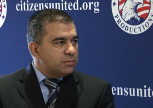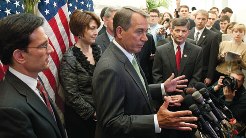Promises to ‘pull out all the stops’ to fight proposed nonprofit regulations
 Texas Insider Report: AUSTIN, Texas – Could a Citizens United v. Internal Revenue Service case be next? “I can commit, with certitude, that Citizens United will not sit by while any government agency tries to violate our 1st Amendment rights,” said David Bossie, president of Citizens United, the conservative advocacy group whose name has become synonymous with unrestricted political spending. His comments came a day after Citizens United submitted opposing formal comments to the IRS’s newly proposed regulations seeking to more specifically define permissible political activity by “social welfare” nonprofits.
Texas Insider Report: AUSTIN, Texas – Could a Citizens United v. Internal Revenue Service case be next? “I can commit, with certitude, that Citizens United will not sit by while any government agency tries to violate our 1st Amendment rights,” said David Bossie, president of Citizens United, the conservative advocacy group whose name has become synonymous with unrestricted political spending. His comments came a day after Citizens United submitted opposing formal comments to the IRS’s newly proposed regulations seeking to more specifically define permissible political activity by “social welfare” nonprofits.
Bossie and Citizens United say it will take the Internal Revenue Service to court if the IRS enacts plans to restrict how certain tax-exempt nonprofit groups spend their money on politicking, as the agency says it may do.
Citizens United’s suit against the Federal Election Commission produced the 2010 Supreme Court decision lifting limits on political spending by corporations and unions. Since that ruling, and particularly after the 2012 election, Democratic leaders on Capitol Hill and their liberal advocacy allies have referring to the Court protected 1st Amendment expenditures as “dark money” groups — 501(c)(4) nonprofits that are not  required to identify donors.
required to identify donors.
While it’s “too early” to discuss specific legal strategy, Bossie added that Citizens United is willing to “pull out all the stops” to fight any Obama Administration effort to pinch nonprofit groups’ ability to engage in politics.
Bossie’s assertion came a day after Citizens United submitted formal comments to the IRS warning the agency to “withdraw” recently proposed regulatory revisions affecting 501(c)(4) “social welfare” nonprofits. Under current law, such nonprofits may advocate for and against political candidate, so long as this doesn’t constitute its primary purpose and they don’t directly coordinate communications with campaigns.
Campaign finance reformers have complained about what they see as “hands-off” IRS treatment of some of these groups which they argue are highly focused on politics, not “social welfare.”
Such nonprofits, which are not required to disclose their donors, have pumped hundreds of millions of dollars into federal political races since the Citizens United v. FEC decision allowed corporations — including  nonprofit corporations — to raise and spend unlimited amounts of money during elections.
nonprofit corporations — to raise and spend unlimited amounts of money during elections.
Republican leaders and some liberal advocacy organizations have criticized the new rule as a brake on free speech and a too-broad crackdown on nonprofits’ political engagement.
Upon issuing its proposed guidelines in November, the IRS noted that there are “number of steps in the regulatory process that must be taken before any final guidance can be issued.”
But given the sensitivity of the issue, and the generally slow pace of high-profile regulatory changes of this magnitude, the IRS could take months to reach a final decision.
Though uncertain, many analysts say it’s unlikely any decision IRS would affect the 2014 Election Cycle — in which Democrats and Republicans are already locked in a bitter, and historically expensive battle for control of the U.S. House and the U.S. Senate.























